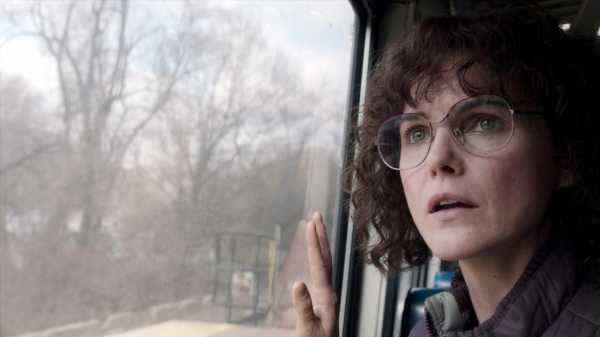
Were you craving a bit more bloodshed from the finale of FX’s “The Americans”? Some tooth-pulling ultraviolence, or maybe another corpse crunched into a briefcase, on the long road to Moscow? If so, you were clearly watching the wrong show. Rather than provide the viewer with bright-red catharsis, “The Americans” went out, after six seasons, in gorgeous shades of asphalt gray and snow white—a dry-eyed tearjerker to the last, leaving behind a chord of moral unease.
In the end, the bad guys (the Jenningses, Russian spies who were somehow also the show’s protagonists) got away with their crimes. A hero went to jail. Two children were left alone. Certain mysteries would never be solved: for one thing, we’ll never find out if Renee was a Russian spy. But if you squinted and ignored the pile of corpses, and the F.B.I. agent whose life was hollowed out for good, “The Americans” was, in its final moments, a portrait of a successful marriage. It was about a life spent raising kids and working long hours, entering a new stage: retirement and an empty nest. “It feels strange,” Philip says, gazing out at the glittering vistas of the country he hasn’t seen for more than twenty years. “We’ll get used to it,” Elizabeth says, although she speaks to her husband in Russian.
A fair amount happened before that Russian denouement, although the crucial sequence began twenty-two minutes in, with a hilariously arch greeting between old friends. “Hey!” the F.B.I. agent Stan Beeman says, cheerfully, to his neighbors, Philip and Elizabeth and their daughter Paige, as they enter a parking garage, preparing to flee the country. “Hi, Paige!” “What . . . what are you doing here?” sputters Philip to Stan, as if they’d all conveniently bumped into one another running errands. Stan holds one finger up and says, calmly, “That’s a great question.”
It was the last moment that Stan would be in control, during a clash of perspectives that should have, by all narrative logic, led straight to prison or, if not, to a shootout, a car chase, or something worse. Instead, ten minutes later, the Jennings were coolly driving away to freedom, as Stan stood by silently, as if paralyzed, watching them go. How did they pull that off?
Six seasons of sharing a beer at the end of the day, that’s how. Thanksgiving together; conversations during Stan’s divorce; watching one another’s children grow up. “The Americans” has always been a show about intimacy, not simply as a human need but as a dangerous vulnerability, the crack that lets the light in. When we first met the Jenningses, they were posing as a family, but were also, after decades, married strangers, raising two children together, just as their Russian handlers had intended. (It’s easier to control your spies when they can’t trust each other.) Then, a crisis—Philip found out that Elizabeth had been raped during her spy training, and then killed her rapist, and by doing so, lost his own chance to defect—changed them, nearly chemically, inspiring a radical leap of faith. Like many more ordinary middle-aged couple facing a midlife crisis, they recommitted, even renewing their marital vows. The rest of the show became the story of this evolving intimacy, a connection that deepened, year after year, despite the Jennings’s radically opposed politics and periods of estrangement—a marital success that came at the expense of many other lives, including those of their own children. “The Americans” would be a romantic story if they weren’t such murderous sociopaths.
In the garage with Stan, Paige, who is only a novice spy, improvises a cover story, which falls apart. Stan gets angry, brandishing his gun. “We had a job to do,” Philip said, acknowledging the truth at last. “We had a job to do.” And then Stan makes his great mistake. “You were my best friend,” he says to Philip, wounded, unable to believe that their relationship wasn’t real. He offers a bridge that Philip crosses. And Philip, who is a master at such moments, transforms, like a werewolf, his eyes softening, into the most powerful form of himself: the tender, honest, authentic, connected Philip—the sensitive modern man, hurt and confused, a persona that he uses to damage others. (Philip might have been sincerely seeking help when he went to the self-help seminar EST, but he only ended up sharpening his tools.) He quickly creates, for Stan’s sake, the illusion of an authentic surrender—and he begins to tell the truth. He’s like the world’s best crisis negotiator, except that he’s trying to get the other man to jump.
When Stan tells him that their friendship has made his life into a joke, Philip mirrors the emotion back, “My life was the joke, not yours.” And then the gaslighting begins in earnest, as they negotiate what was real and what was not: Was Matthew, Stan’s son, ever part of the scam? What about all those people whom the Jenningses killed? At the mention of murder—a crime that Philip knows Stan won’t accept, which would burst the illusion of trust—Philip grimaces, establishing the first big lie: that the Jenningses are idealists who never, ever killed anyone, let alone left two parents bleeding to death in front of their own child. Philip’s daughter nearly ruins this scheme, apologizing, saying, “I’m sorry—” “We don’t kill people! Jesus,” her mother cuts her off, briskly. “We wouldn’t,” Philip says.
It’s too late for Stan anyway, who has lost his ability to read such nuances, and who opens the door for Philip to deliver the aria of a con man: a confession that lets Stan move toward what he really wants, to feel closer to his friend, then help him escape. “I kept doing it, telling myself it was important,” Philip tells Stan about the horror of his job. He shows regret, and then self-disgust, at who he’s finally become: “I’m just a shitty, failing travel agent.” Matthew Rhys runs through all of his most effective facial expressions: the wince, the frown, the toothy half-smile flashed beneath guilty-dog eyes. It’s an act of domination that’s camouflaged as an act of submission. Only Elizabeth knows Philip well enough to admire his craft.
Stan swallows every sedative, especially the mention of Henry, the Jennings’s innocent son, whom Stan desperately wants to protect. Finally, improvising, Philip finds the wedge that works: he tells Stan about the Jennings’s scheme to expose the enemies of Gorbachev, which offers Stan the opportunity to see them not as enemies but as allies. Philip tells enough of the truth for Stan to buy the lie. In plenty of ways, this finale is the exact opposite of “Felina,” the last episode of “Breaking Bad”—an hour that was full of cathartic violence but was also mechanically designed to satisfy the viewer’s bloodlust, to give smooth closure at all costs. Yet this scene with Stan has definite echoes of one of the most interesting moments in “Breaking Bad,” when Walter White visited his ex-wife, Skyler, then owned up to his own selfishness, to committing crimes for his own pleasure. Walt told Skyler what she needed to hear, so that she would do what he wanted her to do: take his blood money and not ask questions. In each scenes, the trap was built in the shape of candor, an irresistible shape for a person who wants to believe.
There was nothing especially flashy about the sequence, which was mostly a set of closeups, with Philip and Stan rarely in the same frame. This was typical of “The Americans” at its best—the show had plenty of beauty and several thrilling action sequences, but it also grew bleaker with the years, willing to deny us escapist pleasures in order to intensify our longing for a little release. (Rewatch the pilot if you’re interested in seeing some nineteen-eighties pink and blue—it’s joyful in comparison to what comes after.) The power is in the performance: “You should hate me—you should,” Philip says, pleadingly. “You should probably shoot me.” And then, after that escapist fantasy of violence, a moment of near-hypnosis: “But we’re getting in that car. And we’re driving away.” Then, after a deep sigh, he adds a manipulative kicker. “I wish you’d stayed with me in EST,” Philip tells Stan. “You might know what to do here.”
I laughed out loud at the line, cruel as it was. Without lifting a finger or pulling a gun, Philip used his legendary eagerness to talk, the emo dampness that often drove his wife crazy, his sincerity, his New Man charisma, to undermine this lonely macho G-Man entirely—a cop who spent many years undercover himself, who should have known all about nurturing the needs of one’s asset. At the line about EST, Elizabeth shoots Stan a flabbergasted side-eye. “You have to take care of Henry,” Paige says, as they leave. “He loves you, Stan,” Philip says, his eyes ringed in red, overwhelmed, for real, at losing his son. “Tell him the truth.”
Then, just before he gets into the car, Philip tosses off a comment that only a best friend could make—the one that would destroy Stan’s life. “I don’t know how to say this, but I think Renee may be one of us”—Stan’s wife, he was implying, might be a Russian spy. Or maybe not. Philip shrugs, then blurs it further: “I’m not sure.” In seventeen words, he saves his marriage and ruins Stan’s. Now Stan has no one whom he can trust: his best friend is leaving, he can never tell his co-workers that he let the Jenningses escape, and Stan’s own wife, Renee, will be a stranger to him, forever. The lovely final shot shows Stan receding, growing smaller, and finally shadowed only in silhouette, as his destroyers drive toward freedom. When we see Stan again, he’s moving through the altered world (his office, where he no longer belongs) in shock, as Dire Straits’s “Brothers In Arms” plays, a song about friendship in wartime.
The rest of the episode is equally elegant. Oleg goes to prison, his family abandoned in Russia—a tragedy, but a morally sound one, which makes Oleg into the show’s rare heroic figure, along with poor Martha and tragic Nina. There’s a showdown with the priest, revealing that even holy men have petty status battles. Henry ends up safe, thank god, with Stan. The Jenningses do make one phone call to their son, on the road, on their way to Canada—“I just want you to be yourself,” his father tells him—and it was the one scene I couldn’t buy. Surely even Henry, innocent as he is, would recognize something sketchy about a phone call in which his iceberg of a mother told him, with a catch in her voice, that she loved him.
The other showpiece moment was the gorgeously paced last-act scene on the train to Canada, a model of suspense designed to lead us to all the wrong conclusions. At first, the scene appeared to be about which of the Jennings would be recognized by the train porter, who was checking an F.B.I. sketch against their passports. Maybe Philip would get caught. Maybe Elizabeth. The most likely victim seemed to be Paige: if she were arrested, and then thrown into prison, her parents would be forced to suffer the repercussions of their actions, at last: chickens coming home to roost.
Instead, the police don’t catch any of them. It’s only as the train is sliding away from the station that Paige’s parents recognize, with shock, exactly what is happening: Paige has abandoned them, to stay in America, without them—and she gazes from the platform as they roll away, unable even to wave.
To me, the saddest, loveliest, and most unusual moment in the finale of “The Americans” was Elizabeth’s dream, which followed that abandonment, as she flew back home to Russia. At first, it’s disguised as reality, until we realize that Elizabeth is in bed with Gregory, her old lover, who died five years before. In the dream, she’s young again, a hardened sophisticate, a chain-smoking true believer in a negligee. “I don’t want a kid anyway,” Elizabeth tells Gregory, confidingly, as he pats her belly. Then she senses that something is wrong. Her room is filled with art—paintings and prints that cover the wall, as if her bedroom were a gallery. On the bedside table, there’s a picture in a frame: it’s her children, Paige and Henry, who are younger, too. Their faces look sad, abandoned. When the camera pulls back, their portrait is echoed by an enormous painting, of a woman’s unreadable face, concealed by a veil of sorrow, or falseness, or maybe just distance. It’s the painting she got from Erica, the angry artist, dying of cancer, who had refused to accept Elizabeth’s stubborn insensitivity—the one who forced her, finally, to look at the world so closely that it changed her.
“The Americans” was a show that didn’t traffic in dreams much, or in wish fulfillment. There was a subtle softness to the finale, however: after all, the viewer knows, even if Philip and Elizabeth don’t, that the Cold War is about to end. Those children they think they lost forever might not be gone for good. (Unlike, I keep thinking, the many people whose families they left bereaved.) And I’m not going to get too histrionic about the end of my current favorite drama, because “The Americans” got to end at the right time—a lucky thing. “There’s a weakness in the people,” the young Elizabeth Jennings observed in the show’s pilot, about the United States, where she was about to spend most of her life. “I can feel it.” The show always knew just how to find ours.
Sourse: newyorker.com






